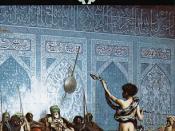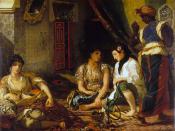Said made a clear analogy between orientalism and colonialism.
They are both set with the same binary opposition.
white/ non white
occidental/ non occidental
In a very detailed and structured study of the orient (behavior, habit,
tradition ...) we document a large amount of fact and data. All compile in
a general study they produce the illusion of a well understood and
objectively constructed knowledge.
These are, in fact, mere observations and purely subjective entities (seen
only with the western eyes) which do not explain nor reflect the true nature
of the object.
We then generalize from theses singles observations, set up categories and
labels. We are now able to answer questions very simply creating this illusion
of knowledge.
We witness the realization of cliches; single sided beliefs
that fuels themselves upon their own ignorance.
SAID then explains how this technique empowers his creator. The rigorous
discourse, the elaboration of thought and ideas, subjectively authenticated
itself. The content is no longer address and leaves the victim of the
discourse reduced to plain and pure denial. The content has become a set
of prejudicial belief (cliches).
To remind you of the famous aphorism: 'the pen is mightier than the sword'
He writes:
'Orientalism is fundamentally a political doctrine willed over the orient
because the orient was weaker than the west.'
Though injustice has already been served and the political establishment
is capitalizing on those cliches, it is interesting to notice that SAID
himself already looks at the orient with orientalism (western eye).
Was the orient really weaker than the west?
Could it be simply that the orient was just farther? May be not
interested? Had no curiosity towards the western world?
Could it be that the orient was to busy and was not much concern
about this western curiosity?...


